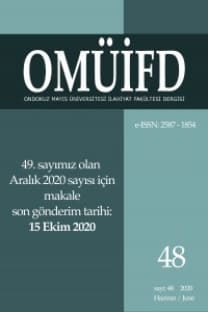İlköğretim ve Ortaöğretim Öğrencilerinin Din Kültürü ve Ahlak Bilgisi Dersine Karşı Tutumları
Araştırmada, ilköğretim ve ortaöğretim öğrencilerinin bazı bağımsız değişkenler açısından Din Kültürü ve Ahlak Bilgisi dersine karşı tutumları incelenmiştir. Araştırmanın örneklemini, Samsun ilindeki ilköğretim ve ortaöğretim düzeyinde değişik okullardan tesadüfi olarak seçilen 944 öğrenci oluşturmuştur. Araştırmada bilgi toplamak amacıyla “kişisel bilgi anketi” ile “Din Kültürü ve Ahlak Bilgisi Dersi Tutum Ölçeği” kullanılmıştır. 20 maddelik Din Kültürü ve Ahlak Bilgisi Dersi Tutum Ölçeğinin Cronbach Alpha güvenirlik katsayısı 0.93 ve ölçeğin maddelerinin birinci faktör yükleri 0.51- 0.76 arasında bulunmuştur. Bu ölçüler, ölçeğin güvenilir ve geçerli olduğunun kanıtı sayılmıştır. Anket ve ölçek yoluyla toplanan veriler “varyans analizi” ile değerlendirilmiştir. Araştırma sonucunda, ilköğretim ve ortaöğretim öğrencilerinin büyük çoğunluğunun (%86’sının) Din Kültürü ve Ahlak Bilgisi dersine karşı tutumlarının olumlu olduğu anlaşılmıştır. Ayrıca, öğrencilerin Din Kültürü ve Ahlak Bilgisi dersine karşı tutumları ile bazı bağımsız değişkenler arasında önemli bir ilişki olduğu görülmüştür. Bu bağımsız değişkenlerden bazıları şunlardır: Öğrencilerin okul düzeyi, anne-babanın öğrenim ve dindarlık düzeyi, annenin çocuğa karşı tutumu, ailenin çocuğuna dinî bilgi vermek isteyip istememesi, öğrencinin okul dışında dinî eğitim almış olup olmaması, öğrencilerin ders kitaplarını beğenip beğenmemesi, öğrencilerin derste yeterli bir dinî bilgi alıp alamadığını algılaması, öğrencilerin dersteki başarı düzeyi, öğrencilerin dersin öğretmenini sevip sevmemesi, ders öğretmenlerinin öğrencilerine karşı tutumları, öğrencilerin öğretmenin ders işleme yöntemini beğenip beğenmemesi.
Anahtar Kelimeler:
-
The Attitudes of the Students in Middle and High Schools Towards the Course of Religious Culture and Ethics
The main purpose of this study is to examine the attitudes of the students attending primary, middle, and high schools towards the course of the religious culture and ethics in terms of some independent variables. The sample of the study consisted of 944 students who were chosen by random technic in various schools in Samsun. Two methods were used to gather data which might help achieve the objectives of the study: the questionnaire of personal questions and “the attitude inventory,” 20 items, towards the course mentioned. The reliability coefficients of Inventory was found 0.93 and factor 1 was found between 0.51-0.76. These coefficients were accepted as reliable and validity. The data gathered by the questionnaire and Inventory were evaluated by using “analysis of variance.” It was understood that most of the students (86 percent) had positive attitudes towards the course. In addition, it was seen that there was significant relationship between the attitudes of students towards the course and some independent variables. Some of the independent variables were as follows: the school level of students, the level of religiosity and education of parents, mother’s attitude towards her children, the situation of whether the parents were giving religious knowledge to their children or not, of the students in terms of taking religious education out of school or not, of the students of liking the books or not, of taking adequate religious knowledge or not, the level of succession on the courses, of the students of loving their teacher or not, the attitudes of teachers towards the students, and teaching methods.
Keywords:
-,
- Yayın Aralığı: Yılda 2 Sayı
- Başlangıç: 1986
- Yayıncı: ONDOKUZ MAYIS ÜNİVERSİTESİ
Sayıdaki Diğer Makaleler
İslâm Hukuk Metodolojisinde İstishâb
Hegel’in Zihin Fenomenolojisi’nde “Arzu” (Desire) Kavramı Üzerine Bazı Düşünceler
İlköğretim ve Ortaöğretim Öğrencilerinin Din Kültürü ve Ahlak Bilgisi Dersine Karşı Tutumları
Hz. Ebû Bekir Dönemi Dış Politikasından Siyasî ve Ahlakî Yansımalar
İnsanın Egzistansiyal İhtiyaçları ve Dinin Perenniyal Cevapları
Hans-Georg Gadamer ve "Hakikat ve Yöntem" (Wahrheit Und Methode) Adlı Eseri
Dinin Gerekliliği ve Dinde Değişim Süreci
